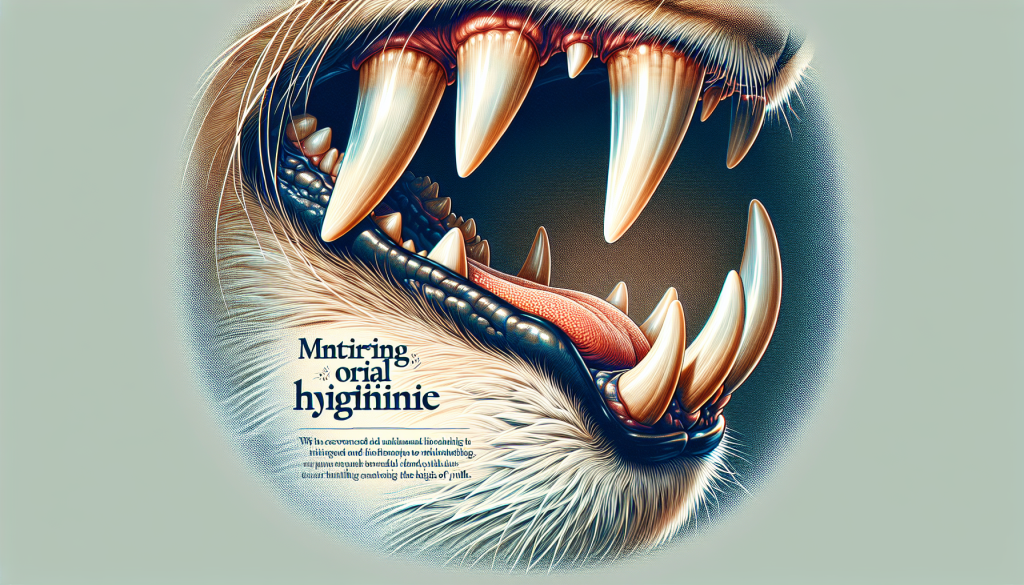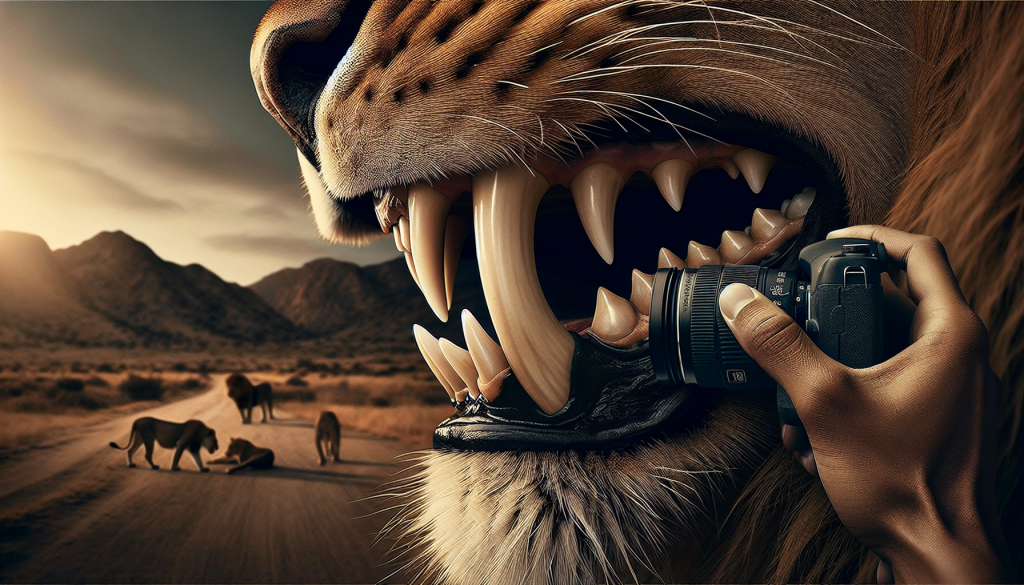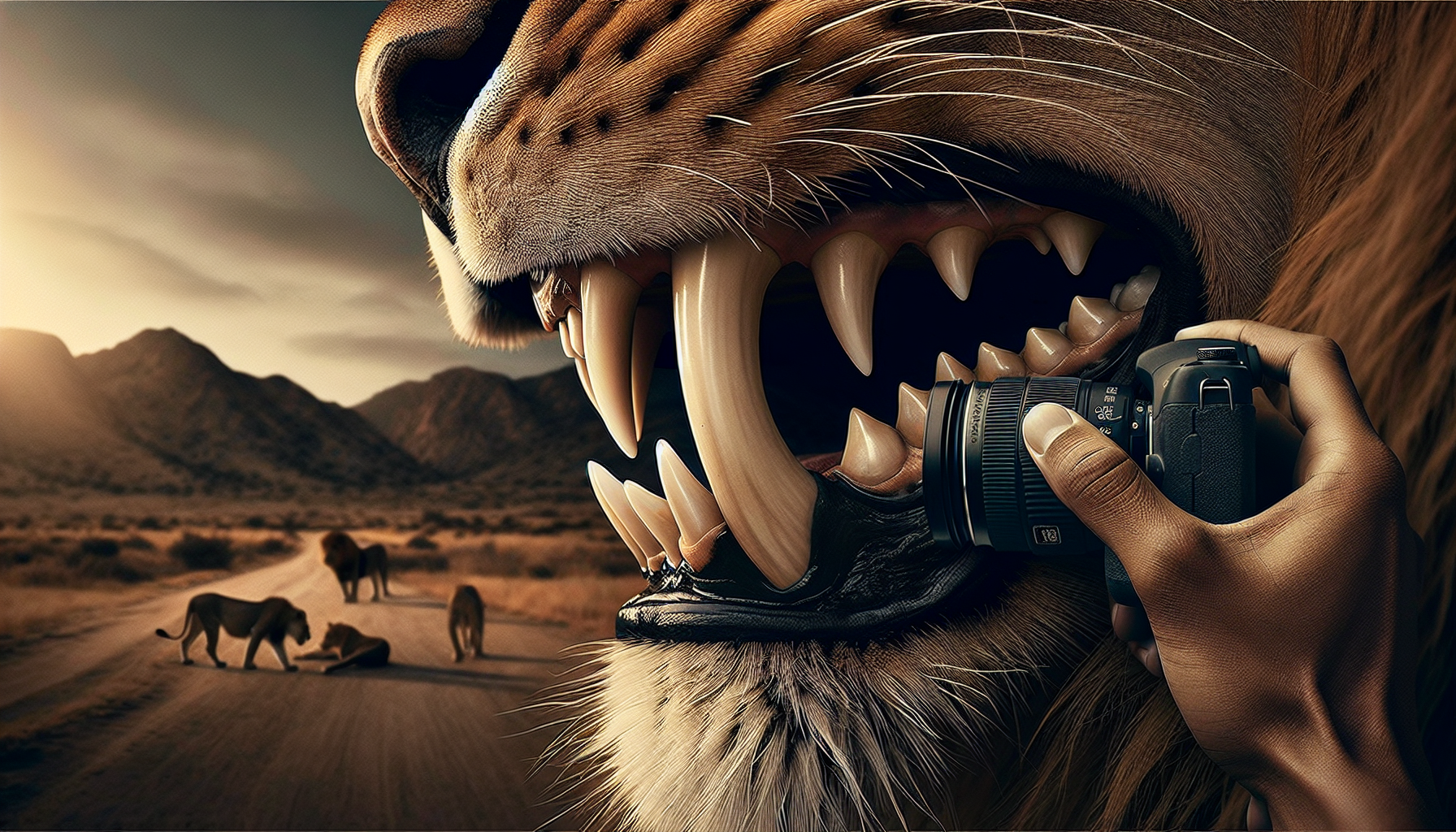You may think of lions as fierce predators, but have you ever wondered how these majestic creatures take care of their teeth? Just like humans, lions need to maintain dental hygiene to ensure they can effectively hunt and survive in the wild. From a young age, lions learn to keep their teeth clean by grooming themselves and their pride members. Additionally, their diet consisting of raw meat helps to naturally scrape off any plaque or debris, keeping their teeth strong and healthy. Join us as we explore the fascinating world of lion dental care and discover the secrets behind their formidable bite.

Dental Structure of Lions
1.1 Types of Teeth in Lions
Lions have a variety of teeth that serve different purposes. First, they have sharp incisor teeth located at the front of their mouth. Incisors are used for gripping and tearing food. Behind the incisors, lions have prominent canine teeth, which are long and pointed. These canines are essential for killing and holding onto prey. Lions also have premolars and molars at the back of their mouth. These teeth are used for cutting and grinding food during chewing.
1.2 Tooth Anatomy and Function
The teeth of lions are designed to withstand the rigors of their carnivorous lifestyle. They have strong enamel covering the outer layer of their teeth, which protects the sensitive dentin underneath. The pulp chamber within the tooth contains nerves and blood vessels. This dental anatomy allows lions to use their teeth effectively for hunting, feeding, and other essential tasks.
Importance of Teeth for Lions
2.1 Hunting and Feeding
Teeth play a vital role in the hunting and feeding behaviors of lions. Lions primarily rely on their teeth to capture and kill their prey. Their sharp incisors and long canines allow them to grasp and deliver a fatal bite to their target. Once a lion has successfully taken down its prey, it uses its teeth to tear apart the carcass and access the meat. Without their teeth, lions would struggle to secure food and survive in the wild.
2.2 Social Interaction and Dominance
Teeth also play a crucial role in social interactions among lions. When it comes to establishing dominance within a pride, lions will often display their teeth as a sign of aggression or defense. The sight of bared teeth warns other lions to back off, preventing potential conflicts. Additionally, lions may use their teeth in play-fighting with each other, helping to strengthen social bonds within the pride.
Natural Dental Care for Lions
3.1 Gnawing and Chewing
One way lions naturally care for their teeth is through gnawing and chewing on bones. Gnawing and chewing help to remove plaque and tartar buildup, keeping their teeth clean and healthy. When lions chew on bones, it stimulates their gums and acts as a natural cleaning mechanism. This behavior is not only important for dental hygiene but also provides mental and physical stimulation for the lions.
3.2 Cleaning through Prey Consumption
Another natural way lions care for their teeth is through consuming prey. As lions tear into their prey’s flesh, the act of chewing and tearing serves as a form of dental maintenance. The rough texture of the prey’s skin and connective tissues can help scrape away deposits on the lions’ teeth, reducing the risk of dental issues.
Self-Grooming Habits of Lions
4.1 Tongue as a Natural Brush
Lions have an efficient self-grooming routine that involves using their tongue as a natural brush. They often lick their fur and body, including their face and mouth. This licking action can help remove debris and bacteria from their teeth, contributing to their overall dental hygiene.
4.2 Lions’ Rough Papillae
Another interesting aspect of lions’ self-grooming is their rough papillae. The tongue of a lion is covered in tiny structures called papillae, which can feel like sandpaper. These rough papillae help remove any remaining food particles, promoting oral cleanliness.

Saliva and its Role in Dental Care
5.1 Lubrication and Moisturization
Saliva plays an essential role in maintaining the health of lions’ teeth. Lions have a substantial amount of saliva, which helps lubricate their teeth while chewing. The lubrication from saliva reduces friction between the teeth and the food, preventing excessive wear and tear.
5.2 Antibacterial Properties
Saliva also contains antibacterial properties that help keep the mouth clean. As lions eat, saliva helps to neutralize harmful bacteria and prevent the growth of oral pathogens. This natural defense mechanism aids in preventing dental infections and maintaining overall oral health.
Dental Issues Faced by Lions
6.1 Dental Fractures
Lions, like any other animals, can experience dental fractures. These fractures can occur as a result of trauma, such as a forceful impact during hunting or fighting with other lions. Dental fractures can cause pain, discomfort, and even difficulties in eating or hunting for the affected lion.
6.2 Tooth Erosion and Attrition
Lions can also face tooth erosion and attrition, which is the wearing down of the teeth over time. As lions age, their teeth may naturally wear down due to the constant use for hunting and feeding. Additionally, chewing on bones and rough surfaces can contribute to tooth erosion. These dental issues can lead to pain, tooth sensitivity, and difficulty in catching prey.
Lions and Dental Health
7.1 Effect of Dental Problems on Lions
Dental problems in lions can significantly impact their overall health and well-being. Pain and discomfort from dental issues can affect lions’ ability to eat properly, potentially leading to weight loss and malnutrition. Dental infections can spread to other parts of the body, causing additional health complications. In severe cases, dental problems may even limit a lion’s ability to hunt and survive in the wild.
7.2 The Role of Zookeepers and Veterinarians
In zoos and captive environments, zookeepers and veterinarians play a crucial role in maintaining the dental health of lions. They regularly monitor the lions’ oral health and provide necessary dental care and treatment. This includes regular dental examinations, dental cleanings, and, if needed, dental surgeries. By addressing dental issues promptly, zookeepers and veterinarians help ensure the overall well-being of captive lions.
Human Intervention and Dental Care for Captive Lions
8.1 Regular Dental Examinations
Captive lions rely on humans to provide adequate dental care. One essential aspect of dental care for captive lions is regular dental examinations. During these examinations, veterinarians can assess the lions’ oral health, identify any dental problems, and develop appropriate treatment plans. Regular dental examinations help prevent and manage dental issues in captive lions.
8.2 Teeth Cleaning Procedures
To ensure proper dental hygiene, captive lions may undergo teeth cleaning procedures. These procedures involve removing plaque and tartar buildup from the lions’ teeth using specialized tools. Teeth cleaning helps prevent dental diseases and maintain optimal oral health for captive lions.
Prevention and Management of Dental Problems in Captive Lions
9.1 Balanced Diet and Chew Toys
A balanced diet plays a crucial role in preventing dental problems for captive lions. Providing lions with a diet that mimics their natural diet in the wild promotes proper dental health. Additionally, giving lions access to chew toys or bones can help simulate natural gnawing and chewing behaviors, which aids in keeping their teeth clean.
9.2 Dental Treatments and Surgeries
In cases where dental problems arise, captive lions may require dental treatments or surgeries. These interventions can include tooth extractions, root canals, or dental fillings. Veterinary professionals make use of modern dental techniques and technologies to address the specific dental needs of captive lions effectively.
Conclusion
The dental structure and health of lions are crucial for their survival in the wild and their well-being in captivity. Lions have specialized teeth and natural behaviors that help maintain their dental hygiene to some extent. However, human intervention, such as regular dental examinations and dental care procedures, plays a vital role in ensuring the oral health of captive lions. By understanding and addressing the unique dental needs of lions, we can contribute to their overall health and enhance their quality of life.

